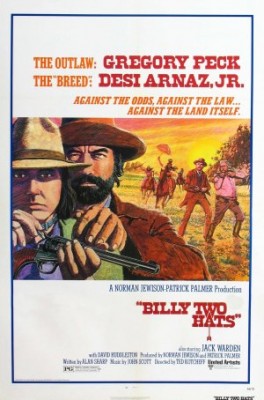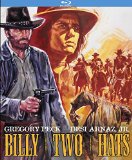| Reviews & Columns |
|
Reviews DVD TV on DVD Blu-ray 4K UHD International DVDs In Theaters Reviews by Studio Video Games Features Collector Series DVDs Easter Egg Database Interviews DVD Talk Radio Feature Articles Columns Anime Talk DVD Savant Horror DVDs The M.O.D. Squad Art House HD Talk Silent DVD
|
DVD Talk Forum |
|
|
| Resources |
|
DVD Price Search Customer Service #'s RCE Info Links |
|
Columns
|
|
|
Billy Two Hats
Many reviewers at the time missed Billy Two Hats' many fine qualities. It's distilled into a compact little story with just six characters of any note. Not much happens. Over the course of three days or so outlaws played by Gregory Peck and Desi Arnaz, Jr. are pursued by lawman Jack Warden. But the characters are richly defined and unusual, and the film impresses with little touches of historical verisimilitude, and almost all the performances are excellent.
Brian West's cinematography is magnificent, and this new Blu-ray really brings out its richness. The disc also includes an entertaining, informative interview with Kotcheff himself.
Following a minor bank robbery of just $420, during which a man was killed, half-breed Billy Two Hats (Arnaz) has been captured by racist Sheriff Henry Gifford (Jack Warden) and as the story begins is being transported back for trial through the New Mexico desert.
They stay overnight at a remote trading post owned by former buffalo hunter Copeland (David Huddleston). Billy's partner, aging Scotsman Arch Deans (Gregory Peck) turns up at dawn the next morning to rescue his friend, shooting Gifford in the shoulder during their escape. Copeland, in turn, shoots Deans as he and Billy ride off. Copeland and the lawman give chase.
Unable to ride with his gunshot wound, Billy and Deans hire a flat wagon from homesteader Spencer (John Pearce), the abusive husband of a mail-order bride, the stuttering Esther (Sian Barbara Allen).
I've never seen this mentioned anywhere else, but Billy Two Hands has a similar set-up and many of the same qualities as Blake Edwards's Wild Rovers (1971), about the friendship of an aging cowboy-turned-outlaw (William Holden) and a younger, impressionable cowhand (Ryan O'Neal). Wild Rovers was originally intended as a three-hour epic but severely cut and altered by its studio. Billy Two Hands, produced by Kotcheff's fellow Canadian director Norman Jewison for release through United Artists, is about equally fine but arguably achieves more with less.
The film has much to recommend it. Peck, with authentic Scottish burr, plays a soft-spoken, gentleman outlaw who'd just as soon pay for goods at Copeland's trading post and for the use of Spencer's wagon than steal them at gunpoint. He quotes from the Bible and offers to teach the illiterate Billy to read. Peck is great here, a perfect example being the scene where he haggles with Spencer for the use of his wagon, the homesteader greedily jacking up the price, unaware of his luck that wanted outlaw Deans is treating him fairly. Peck's reactions to Spencer's demands are enormously expressive, especially as Spencer begins abusing Esther. Deans doesn't want to queer the deal by objecting to his treatment of her, but can't hold back glances of disapproval, either.
The root of Warden's racism goes unexplained but is atypical of such characters. Essentially, his incredulity toward white man Deans's loyal friendship drives an obsession to recapture Billy. Gifford simply can't accept that loyal friend Deans would risk his own life to save a half-breed, or that later a white woman (Esther) would willingly sleep with one. It's an unusual take on intolerance but remarkably perceptive: hate driven by a refusal to accept the possibility that others might not share one's innate beliefs.
Arnaz, often criticized in his handful of leading man film roles (House of the Long Shadows being another), is actually perfectly acceptable as Billy Two Hats, his character's mixture of wide-eyed innocence and hardened qualities coming off quite well.
Better still though are David Huddleston, one of the busiest of ‘70s-era character actors, and Sian Barbara Allen as Esther. His former buffalo hunter marvels at the landscape so vastly changed from the days when one could spend an entire day watching a single epic herd of buffalo pass. Those days are long gone, and it's beginning to dawn on him that maybe progress isn't all it's cut out to be.
Huddleston gives one his best-ever performances, and is at the center of one of the picture's best scenes. Deans and Billy have escaped, riding furiously toward the horizon. Copeland realizes that he has his buffalo gun, a long-range Sharps rifle, mounted on the wall. Copeland then carefully takes his time to load and aim at the fleeing outlaws, now hundreds of yards away. He fires and the bullet flies through the air like a tiny missile, audibly whizzing toward Deans and Billy. As gun enthusiasts know, this entire sequence is extremely authentic and, as depicted in the film, very dramatic and highly suspenseful.
The film's second half introduces Esther, the $100 mail-order bride who stutters, a condition possibly brought on by something like autophobia, the fear of isolation. She had no idea that her husband, abusive besides, resided in the middle of nowhere, several days-ride to even the nearest train depot. Allen, who deserved a bigger career in films, is completely believable as a woman overwhelmed by her oppressive surroundings, and one that would regard the gentle Billy as the man who might rescue her from all that misery.
Video & Audio
In 1.66:1 widescreen, Billy Two Hats looks great, with excellent color, contrast, and high-def detail. The 2.0 mono DTS-HD Master Audio (English only) is fine; no subtitles or other audio options and the disc is Region A encoded.
Extra Features
Supplements include a trailer, as well as one for the John Huston-Gregory Peck Moby Dick (1956), yet to be announced.
The main extra, however, is an enlightening, entertaining interview with director Ted Kotcheff, which discusses why the picture was shot in Israel and, primarily, his impressions of actor Gregory Peck. A nice supplement.
Parting Thoughts
Anticipating a dreary, minor Western, Billy Two Hats took this reviewer by complete surprise. It's a very fine, character-driven film boasting excellent performances and comes Highly Recommended.
Stuart Galbraith IV is the Kyoto-based film historian and publisher-editor of World Cinema Paradise. His new documentary and latest audio commentary, for the British Film Institute's Blu-ray of Rashomon, will be released this September.
|
| Popular Reviews |
| Sponsored Links |
|
|
| Sponsored Links |
|
|
| Release List | Reviews | Shop | Newsletter | Forum | DVD Giveaways | Blu-Ray | Advertise |
|
Copyright 2024 DVDTalk.com All Rights Reserved. Legal Info, Privacy Policy, Terms of Use,
Manage Preferences,
Your Privacy Choices | |||||||













